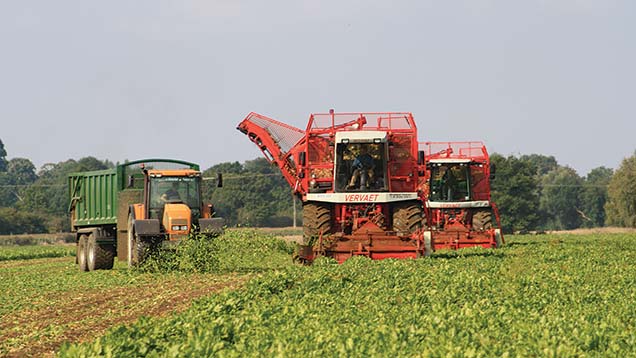Sticking with sugar beet despite hefty price cut

British Sugar’s hefty price cut for the 2015-16 season from £31.67/t down to £24/t has forced many dedicated growers to find ways of raising yields and cutting costs.
At almost 80 adjusted t/ha, the sugar beet enterprise at the Abbots Ripton Farming Company is already a fairly efficient – not to mention viable – operation, but for crop production manager Paul Drinkwater there is still more to be achieved.
See also: Sugar beet growers face hefty price cut
The estate, owned by Lord de Ramsey and family, covers about 2,600ha of Hanslope series clay and black fen soils north of Huntingdon, with a further 900ha farmed in partnership with Strutt & Parker Farms.
Across the combined area, sugar beet accounts for about 340ha and with roughly 25,000t of contract, it is producing as much today as when Mr Drinkwater joined the business in 1977.
So when British Sugar announced plans for the coming season to reduce the planted area by 20% and cut the price paid to growers by 24%, it led to some serious discussions among the management team.
“We looked at taking a holiday, but the practicalities involved mean it’s not as simple as just growing 340ha of something else. If we grew wheat it would all be second wheat and we don’t have the necessary storage.
We could double our oilseed rape area, but at current prices, why would we want to do that?
“We looked at growing more peas and beans, but were unable to find contracts for the additional tonnage. Sugar beet also provides a valuable opportunity for tackling blackgrass, which is an issue on some soils, so after much consideration we concluded that we were best off staying with it,” says Mr Drinkwater.
This season the farm expects the final yield to come in close to 80t/ha (adjusted). This is above the forecast 75t/ha used when finalising the rotation after harvest 2013. For the coming season, given the flexibility in the contract terms and a forecast excess beet price of less than £5/t, he is working on an average yield in the mid- to high 80s.
Sugar strategy
- A mix of high-yielding varieties to spread risk
- Aim to complete drilling by mid-March
- More effective weed control
- Simpler approach to cultivations with a move to non-inversion tillage
- Holding back on cover crops until better able to integrate into farming system
“If next March we are delivering excess beet, I will be ecstatic because we will have averaged nearly 90t/ha,” he says.
While improvements in yields have largely been made possible through better varieties and the increased use of fungicides, more effective weed control has also played a large part.
“Sugar beet is a crop in which performance can be linked directly to weed control and in this respect Betanal maxxPro [desmedipham + phenmedipham + ethofumesate + lenacil] has been a leap forward.
“Sugar beet is easily knocked by herbicides, but we can now control weeds with fewer sprays and application timing is less dependent on weed size, so if you miss a spray, perhaps because of the weather, you no longer have to nearly kill the crop to take out the weeds,” he says.
While crops typically do well at Abbots Ripton – wheats average 9.25t/ha and oilseed rape 4t/ha – the business is under constant pressure to find ways to improve profitability. One area that is being scrutinised is cultivations.
“Last year we lost a contract farming tender to a neighbour who came in with a simpler cultivation regime and substantially lower costs than us. This served as a wake-up call. It might be that we still plough before certain crops or where soil type and weed burden dictate, but we need to review our cultivation philosophy.
“Similarly, we are holding back on cover crops, especially on the heavy land where we can struggle to establish an autumn crop. There is an argument for planting a cover crop ahead of sugar beet, but it would need incorporating and ploughing is a cost we have already begun to question,” he adds.
Early fungicide pays dividends
Fungicide trials carried out last year by distributor Frontier shows the value of deploying the right fungicide strategy to tackle rust, with nearly 14t/ha of extra sugar beet yield.
Christine Lilly, technical manager at Frontier, says with the cost of a fungicide at about £25-30/ha plus about £8-10ha for its application, growers only need to see small yield benefits to pay for it.
The Lincolnshire trials looked at a one-, two- and three-spray programme, primarily using a cyproconazole+trifloxystrobin-based product on dates in July, August and September.
Harvest results show using an early application in July as part of a three-spray programme could boost yields by up to 13.9t/ha compared with a two-spray policy, she says.
While untreated plots yielded 78.5t/ha, a two-spray programme gave a yield of 85t/ha, while a three-spray programme gave a yield of 98.9t/ha when lifted for harvest in December.
This translated to a £383/ha higher gross margin, pushing it to £3,003/ha, highlighting the benefits growers can gain from tackling the disease early and using extra fungicides.
In addition, the difference between a three-spray programme and a one-spray programme was even greater, with a yield gap of 17.9t/ha, offering a £477/ha higher gross margin.
“It shows the big effect that a very early spray can give – it offers good control on rust,” she says.

